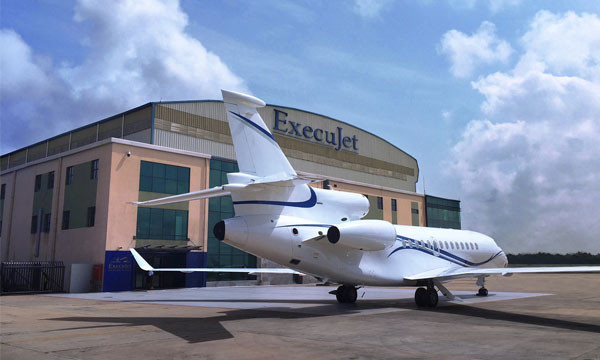Graeme Duckworth, president of Execujet MRO Services: "Dassault wanted to secure its global footprint" |
| Interview by Léo Barnier |
|
|
21 JUN 2019 | 628 words
|
 |
© Execujet |
|
|
|
As last founding member of Execujet Aviation Group in 1991, Graeme Duckworth resisted evolutions and changes in shareholders. He took over the subsidiary Execujet MRO Services when it was created in 2014, and retains it when Luxaviation acquired its group the following year. He even became executive vice-president in charge of the MRO of the Luxembourg giant in 2017. When Dassault Aviation acquires Execujet MRO Services at the beginning of the year, Graeme Duckworth becomes its president again. At 62, he now ensures the integration of the maintenance subsidiary into the French aircraft manufacturer's service network and presents his vision to the Journal de l'Aviation.
What was it that made Dassault Aviation decide to buy out ExecuJet's worldwide maintenance activities from the Luxaviation group?
In buying out Execujet, Dassault Aviation's objective was really to secure the worldwide footprint for its services. Execujet actually has eleven MRO centres around the world, and that's what grabbed their interest.
Dassault could quite easily have designated them all as approved service centres, but recent transactions - and in particular one in the Asia-Pacific region with control of an MRO company being taken by a manufacturer (Jet Aviation, a sister company of Gulfstream, bought out Hawker Pacific in 2018, ed.) - made them realise the importance of securing this footprint.
How is this integration influencing your model and your strategy?
It's an easy transition. Dassault's own fleet isn't big enough to keep these centres full. This means that they need to service other types of plane. My challenge was to maintain the good relationships we currently have with Bombardier, Embraer and Gulfstream in particular, despite the change in owner, and ultimately to keep everyone happy. We have reached a logical position which involves providing the same level of service to everyone. We mustn't favour Dassault or any other manufacturer.
What is the share of the different aircraft manufacturer in your activity?
Dassault's share is very low for the moment. Only two of our centres are currently providing support for Falcons, one in South Africa and one in Nigeria. I would estimate Dassault's share at 10% in each of these two centres. Our activity is mainly with Bombardier, followed by Embraer and Gulfstream. Then we have Textron Aviation with the Beechcrafts.
Is Dassault Aviation's share planned to increase?
The idea is for each of our facilities to become a Dassault service centre and to have enough capacity to take care of the Falcons which are already set up or will be set up in the zones that we cover. Dassault's share should therefore naturally increase. We are preparing our employees in Dassault products from now on. We already have training in progress and several sessions are scheduled.
Many of our sites have been pretty successful and are close to saturation. Therefore, we have an expansion programme with the construction of a new facility in Dubai, one in Kuala Lumpur and finally one or two others in Australia. This was already on the table before the transaction, but it's now even more important for us to extend ourselves. This is a good thing for us.
Are you planning to recruit to support this expansion?
Yes, of course. We are planning to create jobs at all the sites we are developing. Not only are we building larger facilities, but we also want more one-stop facilities. For now, we're not involved in complete plane interior redesign and painting, but the Kuala Lumpur and Dubai centres will be offering a complete service. We'll do it either on our own or with partners, but we will do it. We currently have 460 employees and we want to reach 600 within two years' time.
|
|
 |
Léo Barnier
Specialized journalist
Industry & Technology, Equipments, MRO
|
|
| |
They made this section possible |
|
|
|
|
|
|
|
|
|
|
|
|
|
|
|
|
Top stories |
|
|
|
|
|
Top stories
|